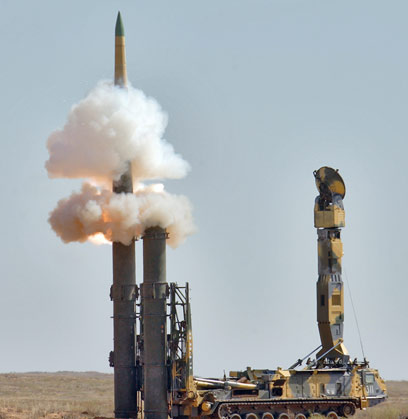
Official: Israel may not have answer to Syrian missiles
Ex-Military Intelligence senior worried Iron Dome may fail against strike on Tel Aviv. 'Assad losing control of arsenal,' claims Major-General (res.) Dayan. Russian long-range missiles shipment raises tensions
Israelis awoke to reports that Syrian President Bashar Assad has placed advanced surface-to-surface Tishreen missiles on standby with orders to strike at Tel Aviv if Israel launches another air strike on Syrian targets.
The report was based on reconnaissance satellite photos said to show preparations for the deployment of the missiles, which Israeli analysts say could cause extensive damage to the country.
Related stories:
- Report: Syria prepared to fire missiles at Tel Aviv
- Israel warns against Russian arms supply to Syria
- Hezbollah suffers heavy losses in Syria
"I'm not sure Israel has an answer to some of the missiles which the Syrians have and I'm not sure that the (anti-missile system) Iron Dome can be successful here,” Mordechai Kedar, a former senior military intelligence official and professor of Middle East Studies at Bar Ilan University told The Media Line.

Russian S-300 missiles (Archive Photo: AFP)
“So Israel might be exposed to all kinds of attacks by Syria which could use weapons which are not allowed,” he said referring to chemical weapons.
“In short, Israel might face a very big problem, especially where there are large concentrations of population like Tel Aviv,” he continued. The difference between this and all out war with what's left of the Syrian regime is very close."
But other experts believe that Syrian President Bashar Assad is not interested in opening another front against Israel while engaged in his battle to survive.
“Syria today is much weaker than it used to be and it will take a long time to regain its military strength,” Major-General (res.) Uzi Dayan, former head of Israel’s National Security Council, told The Media Line. “Assad is losing more and more control of the periphery of the country and parts of his arsenal.”
From Israel’s perspective, he says, the best option for now is for the stalemate between Assad and rebel fighters to continue.
“We don’t want to take sides in what’s happening in Syria but we also don’t want to do anything to accelerate the fall of Assad,” Dayan said. “It’s not good guys vs. bad guys.”
Israel has still not confirmed it was behind two recent strikes on weapons that were reportedly on their way to Hezbollah terrorists in south Lebanon. But Prime Minister Benjamin Netanyahu told his cabinet that Israel will do whatever is necessary to stop Hizbullah from obtaining more advanced missiles.
"Our policy is to stop, as much as possible, any leaks of advanced weaponry to Hezbollah and other terrorist organizations,” Netanyahu said. “We will continue to act to ensure the security interests of the citizens of Israel."
Israel is also concerned about the S-300 Russian air defense system which Moscow has pledged to deliver to Syria. Netanyahu himself flew to Russia last week in a failed mission to try and stop the sale.
“These weapons are dangerous,” senior Defense Ministry official Amos Gilad said. “If Hezbollah and Iran support Syria, why shouldn’t (the Syrians) transfer these weapons to Hezbollah? It’s a threat to us, a threat to the Americans and a threat to the Persian Gulf.”
The reference to the Persian Gulf seemed to be implying that Iran could also gain control of this system, either from Hezbollah or directly from Russia.
According to Kedar, it is even possible that Iran could take over Syria if it feels its proxy, Bashar Assad, is losing his grip on Syria.
"Iran can very easily send troops into Syria to take this country (Syria) because Iraq would allow Iranian troops to cross through on their way into Syria,” Kedar said. “This is a feasible scenario. Though the world will object and condemn it, I don't see any other army which would try to invade Syria only to fight the Iranian army."
Both Kedar and Dayan say the Assad regime will eventually fall, although it could take many more months. Yet, from Israel’s perspective, what will come after Assad may be even worse.
This article was written by Linda Gradstein
Reprinted with permission from The Media Line
- Receive Ynetnews updates directly to your desktop










